When theory meets practice
Democracy at university put to test during anniversary ceremony
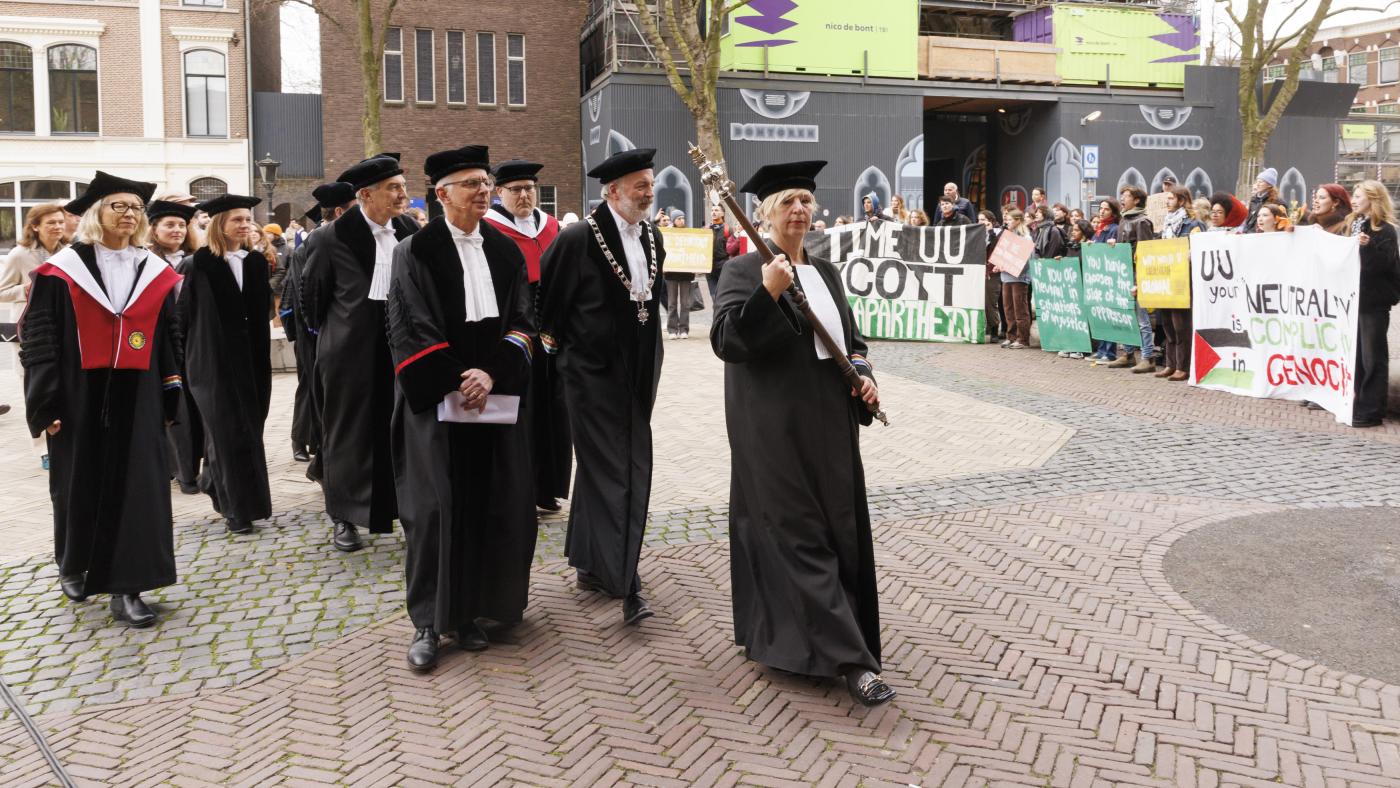
Democracy is under attack. According to Professor of Public Administration Mark Bovens, only 13 per cent of the world's population lives in a fully-fledged democracy under the rule of law. During his Anniversary Address on Tuesday 26 March in the Dom Church, he said: “Such a country has free and fair elections, a balanced distribution of power, room for political participation and a certain degree of political equality. To nurture democracy, attention must be paid to the unwritten rules and the restraint of governance.”
Professor Bovens advocated restraint in the use of force in maintaining public order and when banning expressions, demonstrations, or organisations. He noted that in countries that autocratise, academic freedom is one of the first freedoms to come under attack. And in countries that are democratising, universities and students often lead the way. "One of the ways universities can help safeguard the future of democracy is by letting students experience the unwritten rules of democracy as much as possible," he said. As examples, he cited fostering rich social activities, broad participation for all sections of society, and plenty of opportunities for student participation in university journalism. "This includes maintaining a pluralistic and liberal culture of debate, where opponents are not vilified and there is room to hear research on uncomfortable topics."
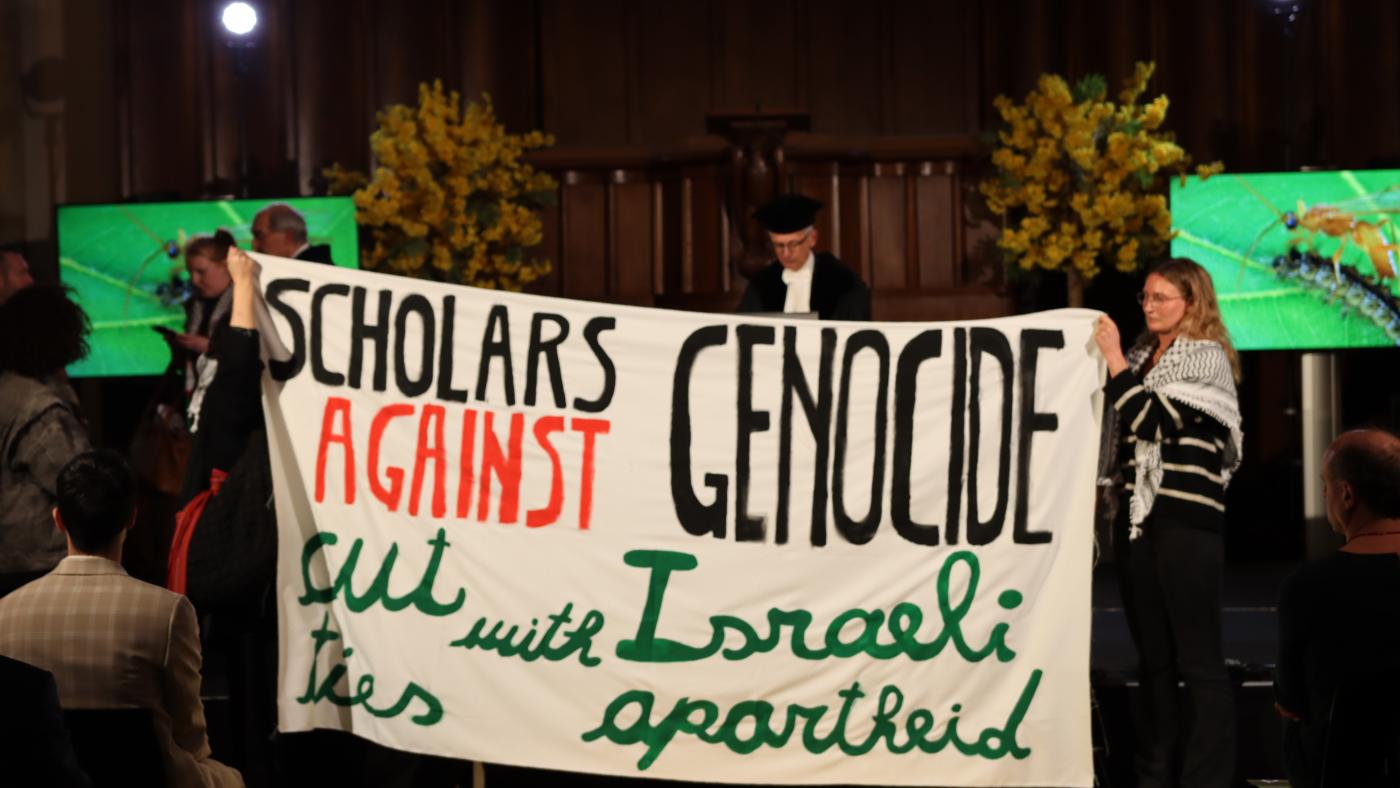
Protest during Mark Bovens' anniversary address. Photo: DUB Irem Zoodsma
Ashamed of UU
Bovens’ call did not fall on deaf ears. He had barely begun his speech when activists came on stage to protest against the university's lax attitude towards Israel. They rolled out a banner reading 'Scholars against genocide' and a university lecturer expressed the scholar’s grievances. They are angry about the fact that UU is taking a neutral stance while three university presidents and ninety-five professors and deans have already been killed in Gaza. Six universities were destroyed. The lecturer on stage said she was ashamed to work for a university that remains quiet about this. The president of the Executive Board, Anton Pijpers, came on stage and tried to gently coerce the lecturer to the side of the stage. "There have already been protests, we are going to stop this now,” he said. Bovens waited patiently until the activists had left the stage before continuing his story on zombie democracies. It all became rather uncomfortable.
Neutrality does not exist
This was the second protest during the ceremony. Before, during the procession at Dom Square, the professors in togas witnessed a large group of protesters shouting slogans like “What do we want: Boycott!” and “Free free Palestine”.
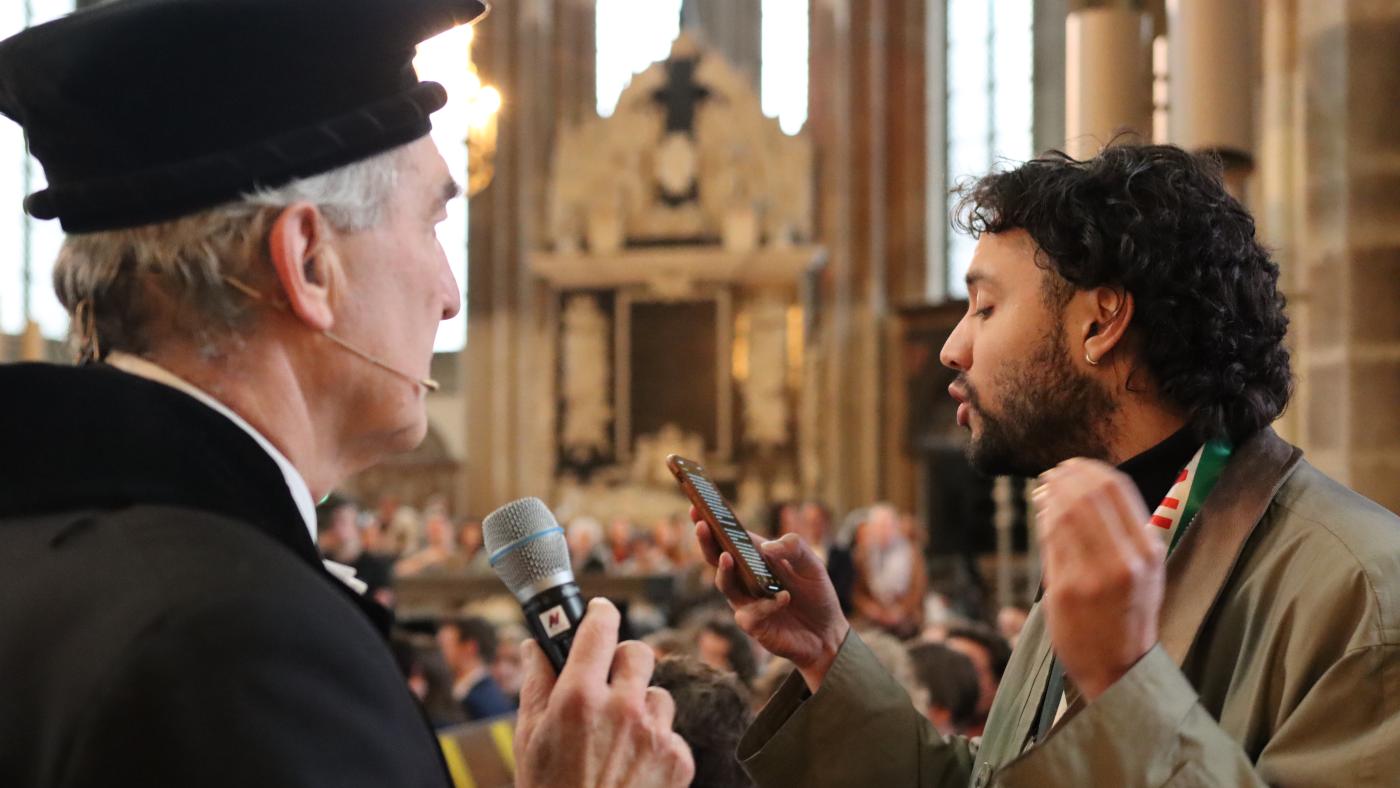
Anton Pijpers lets protesting student speak. Photo: DUB Irem Zoodsma
During rector Henk Kummeling's speech, a student in the hall also stood up to protest. The rector was just talking about the importance of democracy. He referred to non-democratic Russia, where the opposition has been silenced. He also mentioned the importance of adhering to an informal democratic culture and ethos. During the interruption, he said: "This is democracy in practice."
President of the Executive Board, Anton Pijpers, took the microphone and walked up to the student, who explained that it took the university five days to condemn Russia, and eleven days to boycott Russian universities, but that they had been working for six months to get the university to condemn the genocide in Gaza.
"Neutrality does not exist in this conflict," said another student. "How can you celebrate this party about democratic values when you won't speak out about the genocide?" added yet another student on the other side of the room. Pijpers then became somewhat impatient and asked the activists to stop, but there was no intervention. After the three statements, Kummeling continued his speech.
Strengthening democracy
In it, he advocated strengthening democracy at the university. He thinks it’s good that students and staff want to actively think about certain topics, such as Gaza or fossil industries. The university is looking for new ways and procedures to start the discussion. One example is the deep-democracy approach last year, where there was talk of working with the fossil industry.
For Kummeling, a strengthening of democracy goes hand in hand with the solid foundation of co-determination. He notes that many protesters, such as those protesting against cooperation with the fossil industry or the campaigners for Palestine, don’t seem to want to participate in the university’s councils. This is unjustified, he believes, because therein lies the strength of democracy within the university. "A university benefits not only from an administration but also from strong student and staff representation in policy and decision-making, in organising accountability for this decision-making and in providing advice to administrators. We need to further strengthen participation in these committees and councils, including through recognition and rewarding."
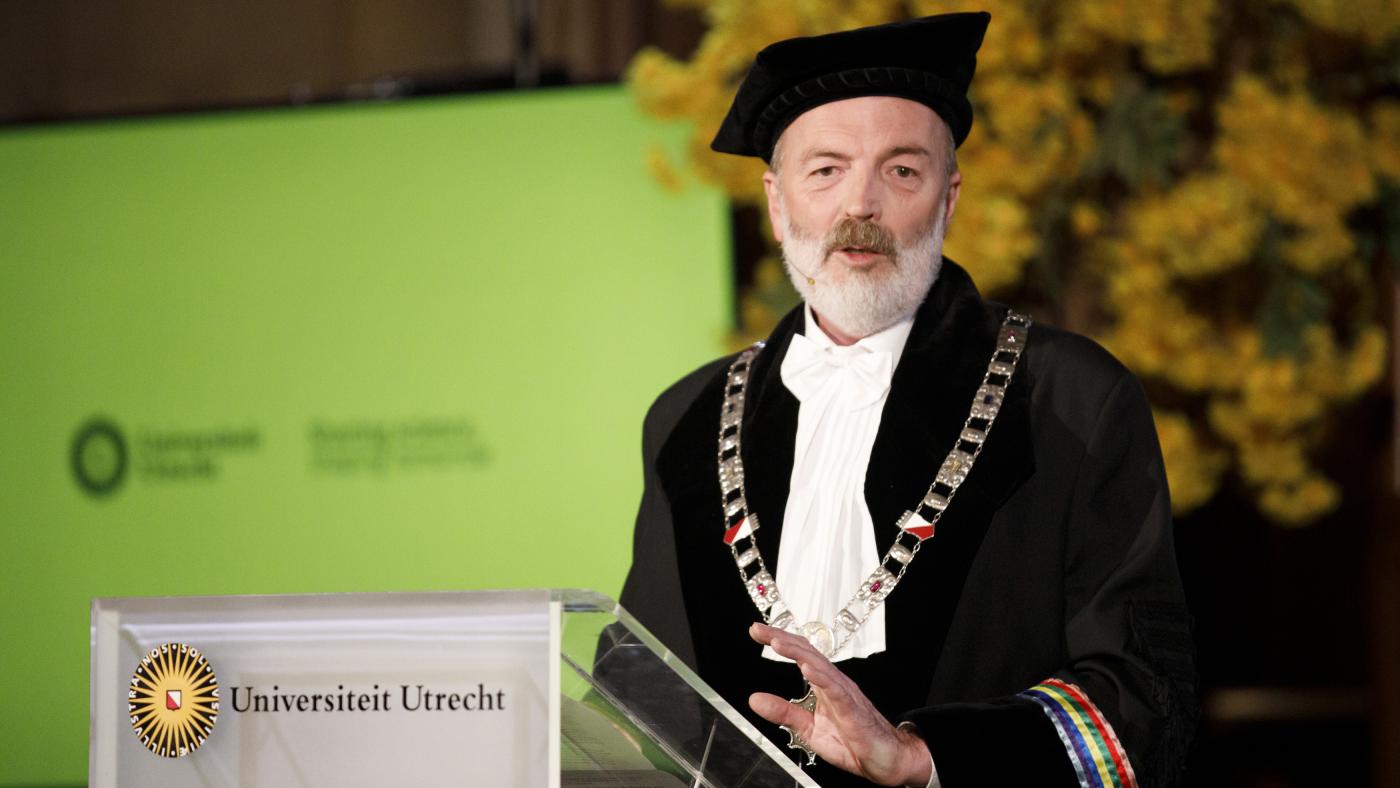
Rector Henk Kummeling. Photo: Bas van Hattum
Conditions
Freedom of expression at the university does have a few conditions, according to Kummeling. For example, elected councils should be respected. "They are elected to represent the interests of all individuals within the faculties and the university as a whole. This is sometimes forgotten or even deliberately brushed aside by those with a specific interest in mind."
A second condition is tolerance. The wishes of others deserve our respect and should not be dismissed as morally reprehensible. And finally, a person who strengthens his argument by citing a scientific authority, invoking academic freedom, must be able to validate this opinion with recognised scientific methods. Activist researchers have a role in social debate, but Kummeling says they should only do so if their views are scientifically and academically sound. Researchers should also be open to having their views challenged.
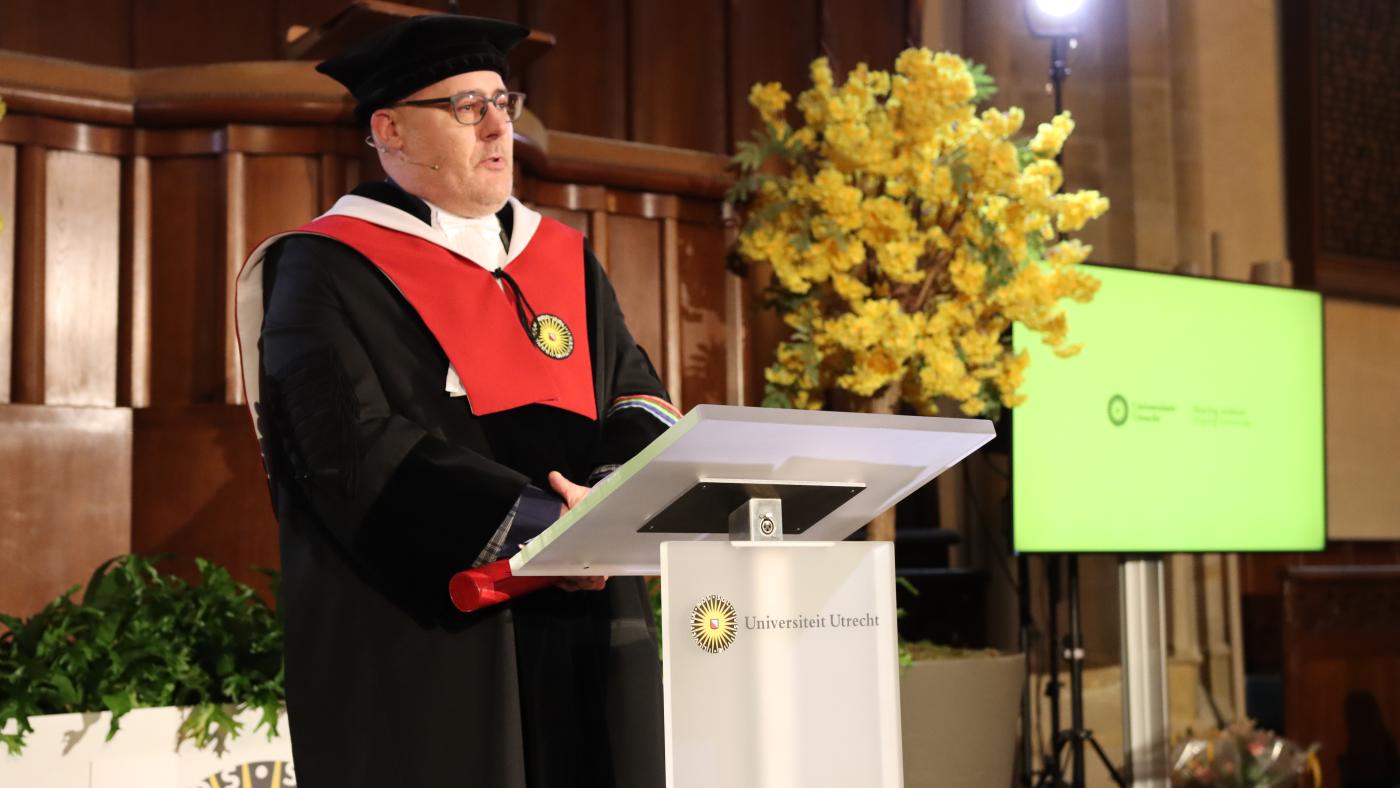
Honorary doctor Matthey Flinkers. Photo: DUB/ Irem Zoodsma
Close encounter
Thus, the celebration became a close encounter of democracy in theory and practice. The Executive Board had anticipated the possible presence of protesters who wanted their views heard during the celebration, but it was agreed that the protest should not unduly jeopardise the progress of the ceremony. A clear line was drawn there.
Upon accepting his honorary doctorate for his work on the meaning and shaping of politics, democracy, and good governance, honorary Doctor Matthew Flinders of the University of Sheffield said: "I respect the way this university has handled the protest. In other countries where I’ve worked, such protests would have been crushed and they would have been immediately expelled from the venue. Here, they were listened to with respect, even if it was not a green light to disrupt the whole ceremony." Mark Bovens said in his lecture that a university is the future of democracy when it allows students to experience the unwritten rules of democracy.